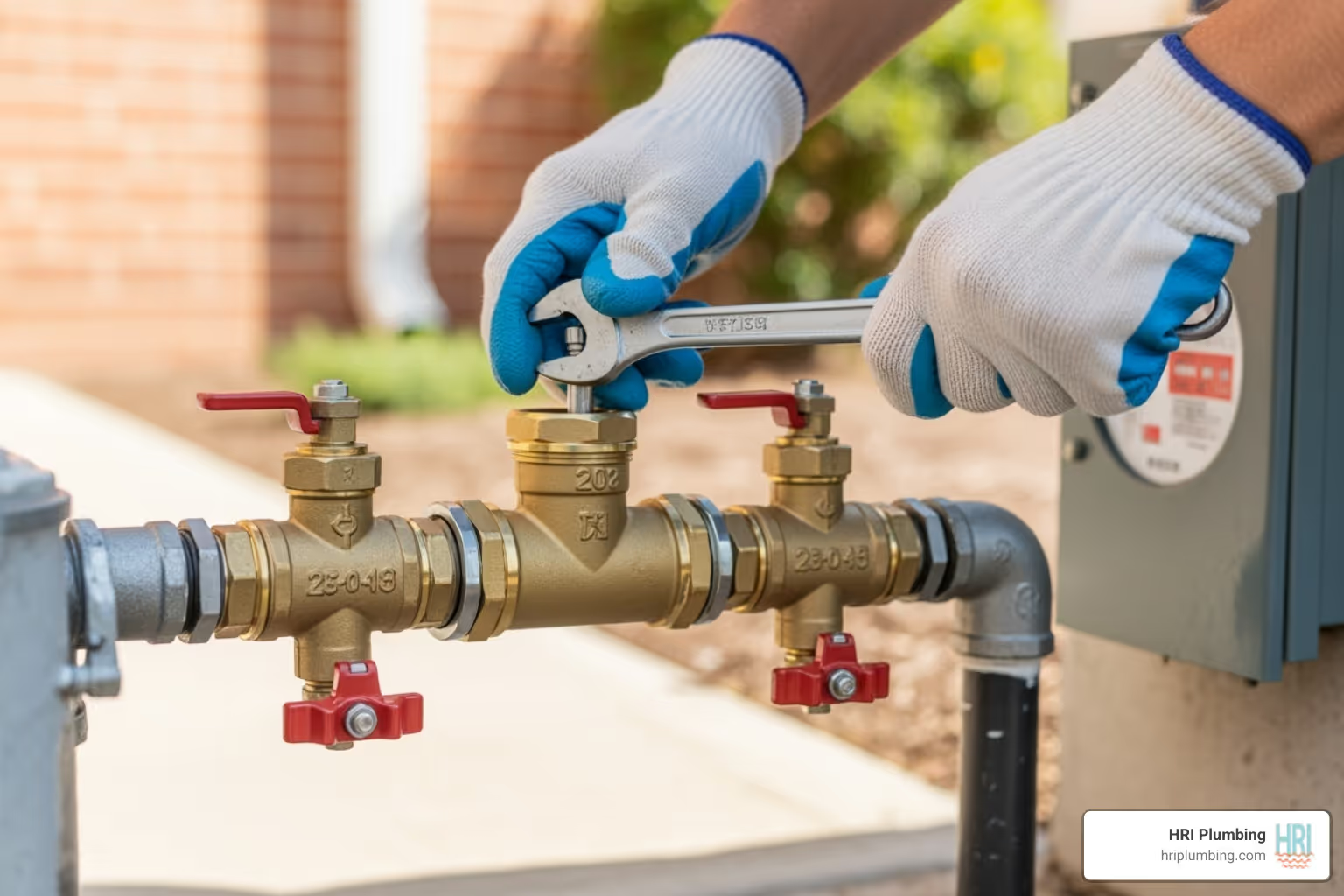Why Your Water Safety Depends on Backflow Prevention
A backflow prevention installation service is your primary defense against water contamination. It stops non-potable water from flowing backward into your clean water supply, protecting your home from serious health risks caused by contaminants like sewage, chemicals, and pesticides.
Here's what you need to know:
- What it does: Prevents contaminated water from reversing flow into your drinking water.
- Who needs it: Properties with irrigation systems, fire sprinklers, pools, or commercial operations.
- Installation: Certified professionals assess your property's hazard level, select the right device, and ensure code-compliant placement.
- Requirements: Most municipalities mandate annual testing by certified technicians.
- Lifespan: Devices typically last 5-10 years with proper maintenance.
Backflow occurs due to unexpected water pressure changes, such as a pipe break or fire hydrant use. This reversal can pull contaminants from a cross-connection—where clean and dirty water systems meet—directly into your drinking water.
The dangers are significant. In one incident, a backflow issue at a farm caused fertilizer to contaminate the tap water of 30 nearby homes. Professional installation is crucial to ensure your device meets local codes and effectively protects your water supply from day one.

Backflow prevention installation service vocabulary:
Understanding Backflow and Why Prevention is Crucial
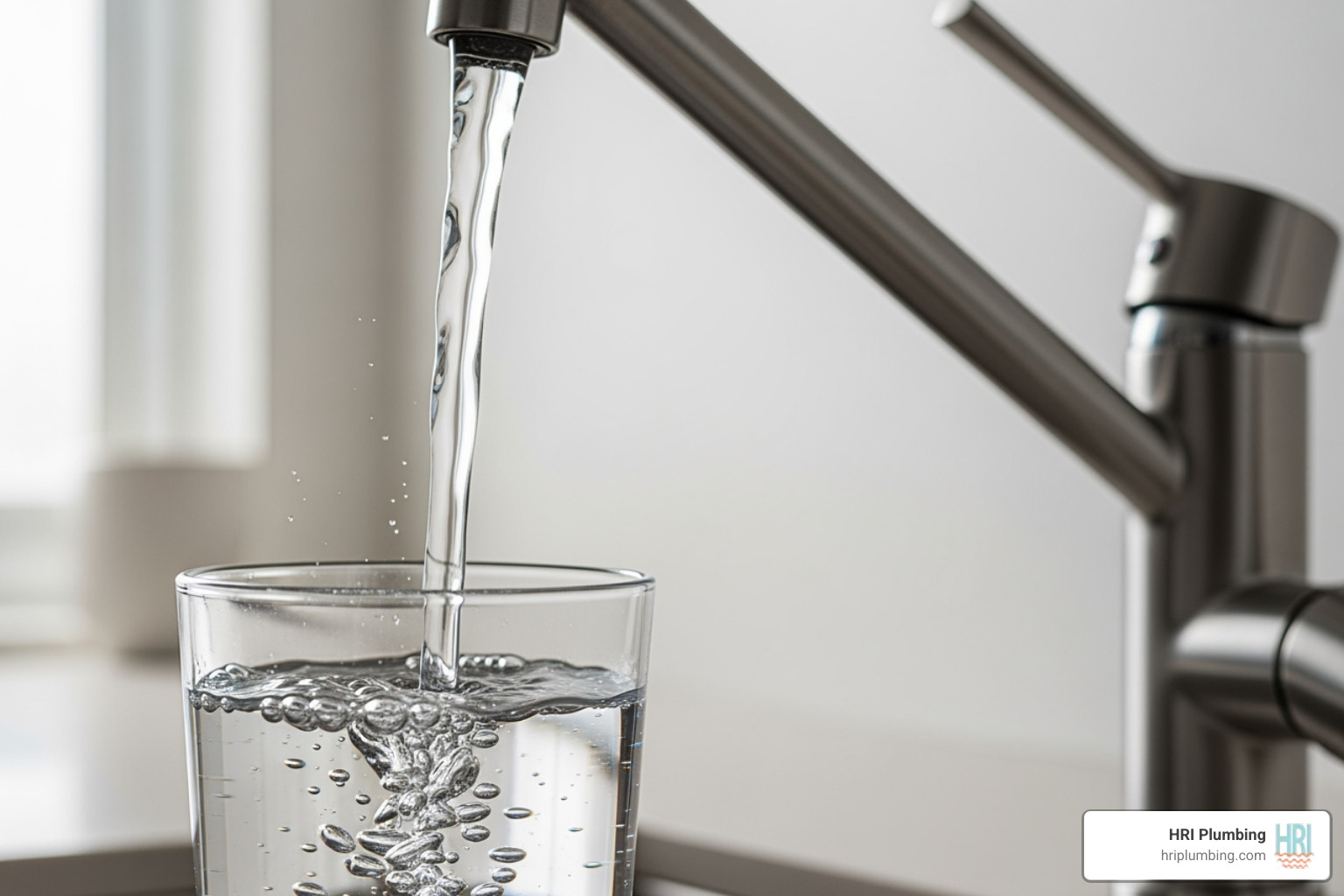
Every time you use your tap, you trust the water is safe. A hidden threat called backflow can compromise that safety by reversing the flow of water, pulling contaminants back into the clean supply. This is a serious public health hazard that a backflow prevention installation service is designed to stop.
What is Backflow and Why is it Dangerous?
Think of your plumbing as a one-way street for fresh water. Backflow occurs when that street reverses. This happens in two ways:
- Back-siphonage: A sudden drop in city water pressure—from a water main break or hydrant use—creates a vacuum, sucking water backward from sources like your irrigation system or pool.
- Back-pressure: When pressure in a non-potable system (like a boiler) exceeds the pressure of your clean water supply, it pushes contaminated water back into your drinking lines.
The danger lies in what gets pulled into your water. Contaminants can include fertilizers and pesticides from lawns, detergents from dishwashers, sewage from compromised lines, and chemicals from pools or industrial facilities. These can lead to waterborne diseases, gastrointestinal illness, and chemical poisoning. Protecting your water supply is essential for keeping your family and community safe.
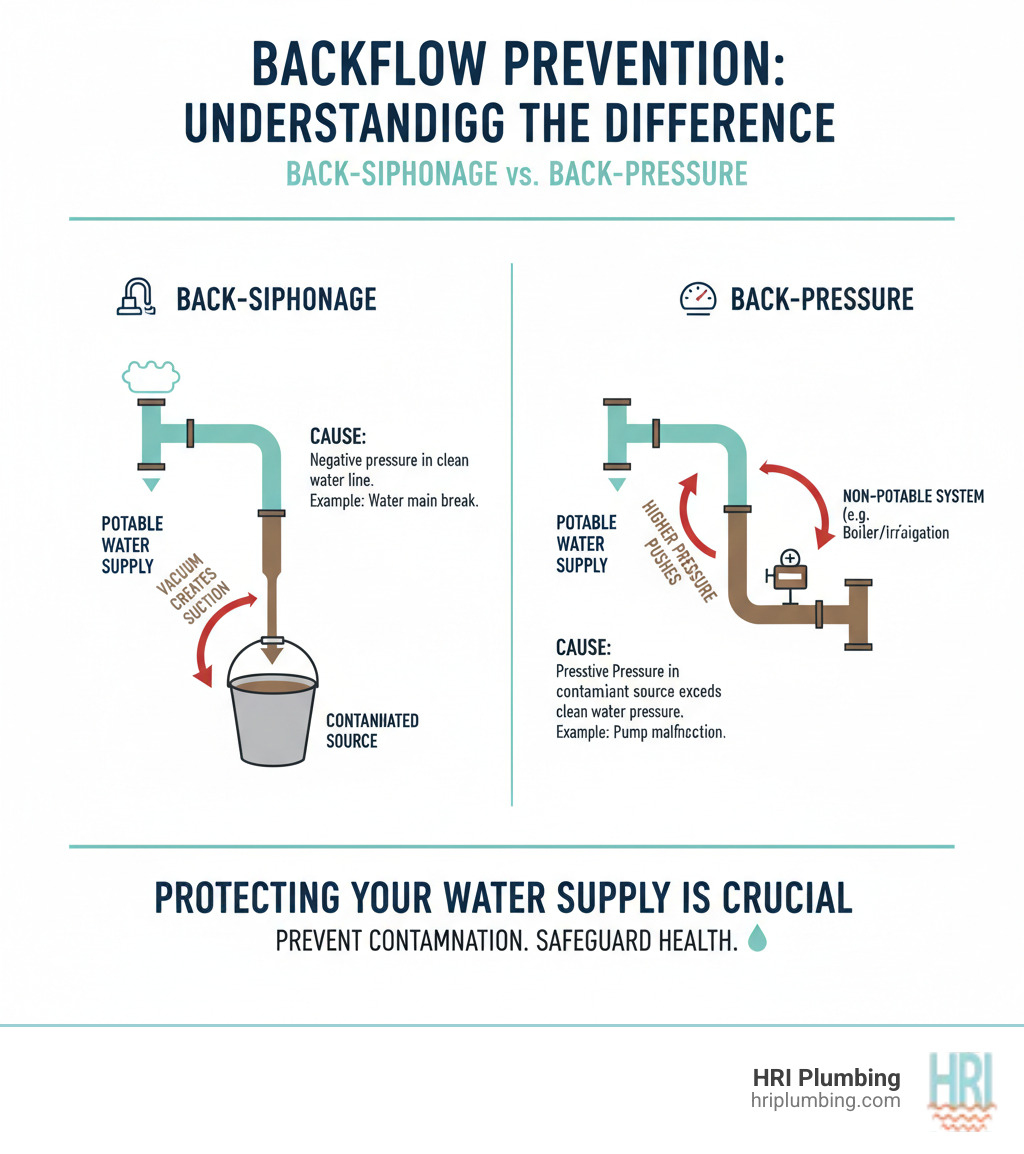
How to Know if Your Property Needs a Backflow Preventer
Your local water authority sets the rules for backflow prevention to protect the community water supply. State and municipal codes specify which properties require a device.
Commercial and industrial properties almost always need backflow preventers, especially facilities with boilers, cooling towers, or those that handle chemicals. These are often considered high-hazard and require robust protection.
For homeowners, the need often depends on specific features. Lawn irrigation systems are a primary reason, as they can pull soil, fertilizers, and pesticides back into your drinking water. Other common triggers include swimming pools, fire sprinkler systems, and auxiliary water sources like a well connected to the public system.
Your water authority may survey your property for cross-connections. If one is found, you will receive a notice requiring you to install a backflow prevention device, typically within 30 days. Ignoring these notices can lead to water service interruption. If you're unsure, check with your local water authority or a professional plumber. For more details, see our guide on When Is Backflow Testing Required for Plumbing Systems?.
Your Guide to Professional Backflow Prevention Installation Service
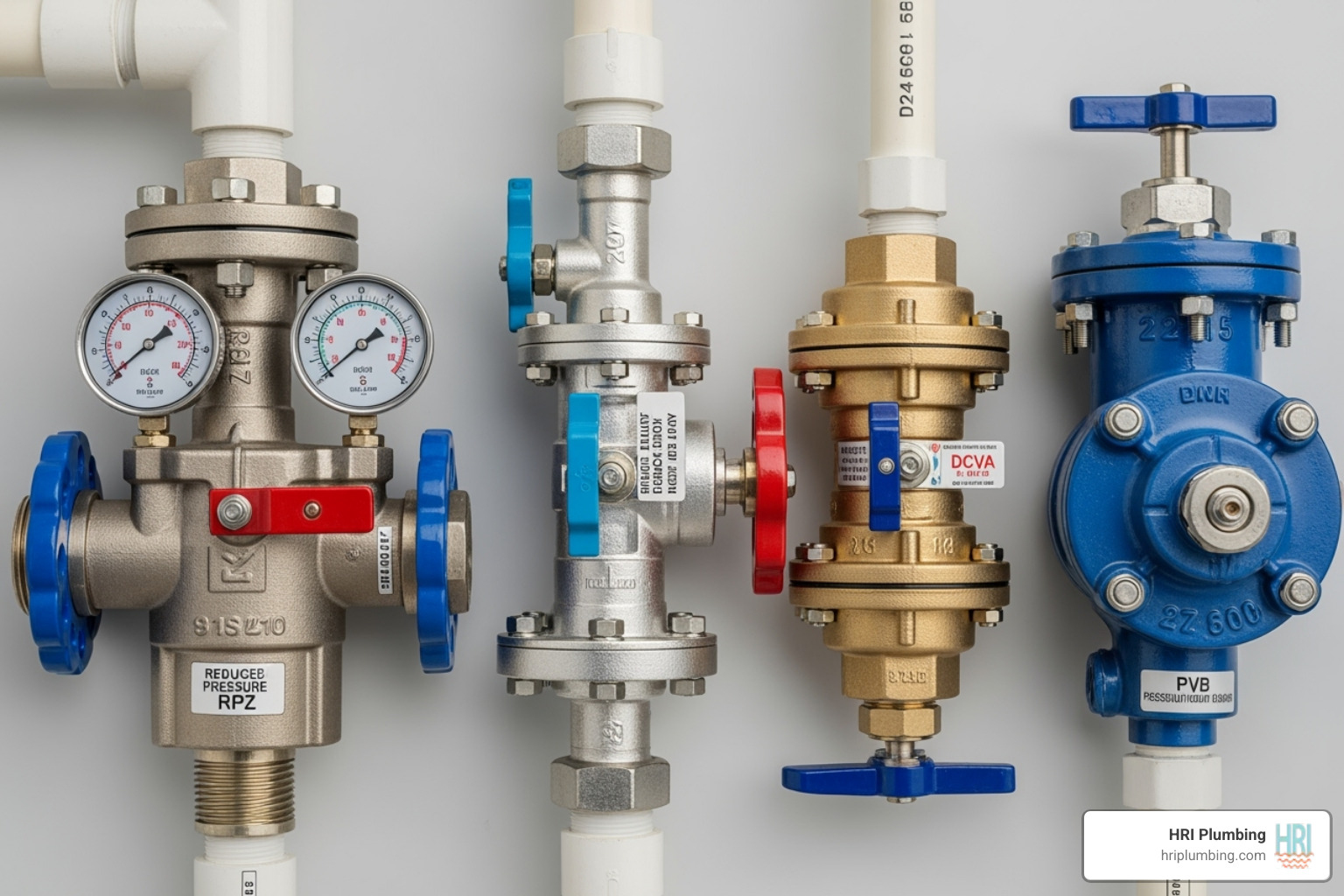
Once you know your property needs a backflow preventer, a professional backflow prevention installation service is your next step. This isn't a DIY project; it requires specialized knowledge of risks, equipment, and strict regulations to protect the public water supply.
Common Types of Backflow Prevention Devices
The right device depends on your property's hazard level. A professional assessment will determine which type is required.
Reduced Pressure Zone (RPZ) Assembly: Used for high-hazard applications where contaminants could be toxic (e.g., medical facilities, industrial plants). This is the most protective device, featuring a relief valve that discharges water to prevent any backward flow.
Double Check Valve Assembly (DCVA): Suitable for medium-hazard systems where contaminants are non-toxic but still undesirable (e.g., standard irrigation, fire sprinklers without additives). It uses two check valves to maintain pressure and prevent reversal.
Pressure Vacuum Breakers (PVB) & Atmospheric Vacuum Breakers (AVB): Common for low-hazard protection, like residential irrigation systems. These devices prevent back-siphonage but not back-pressure, making them suitable only for lower-risk situations.
Choosing the wrong device can leave your water supply vulnerable and violate local codes. A professional ensures the correct device is selected for your specific needs.
Key Steps in a Professional Backflow Prevention Installation Service
A professional installation follows a precise process to ensure compliance and safety.
- Site Assessment: A technician examines your plumbing to identify all potential cross-connections and determine the hazard level.
- Device Selection & Permitting: Based on the assessment, the appropriate device is selected. We also handle any necessary permits with local authorities in Jacksonville, Springfield, and Rushville.
- Proper Placement: Placement is critical. The device must be installed near the water meter, above ground, and with adequate clearance (12-36 inches) for future testing and maintenance.
- Professional Installation: Certified plumbers install the device, including upstream and downstream shutoff valves, ensuring all connections are secure and oriented correctly.
- Testing and Certification: Immediately after installation, a certified tester verifies the device is working correctly and submits the results to the water authority, ensuring your system is compliant from day one.
For comprehensive plumbing solutions beyond backflow prevention, explore our full range of Plumbing Services.
Navigating Local Regulations and Compliance
Backflow prevention is mandated by law to protect shared public water supplies. State and municipal codes, enforced by local water districts, dictate the requirements. Commercial, industrial, and multi-family properties typically face the strictest rules.
Annual testing is a near-universal requirement to verify your device functions correctly. Missing a deadline can result in water shutoff. Additionally, modern regulations require lead-free components for any device connected to a potable water system. All devices must be approved by organizations like the American Water Works Association (AWWA), which sets industry standards for equipment and tester certification.
Our team stays current on all regulations in Jacksonville, Springfield, and Rushville, ensuring your installation is fully compliant.
Ensuring Long-Term Safety with Professional Maintenance
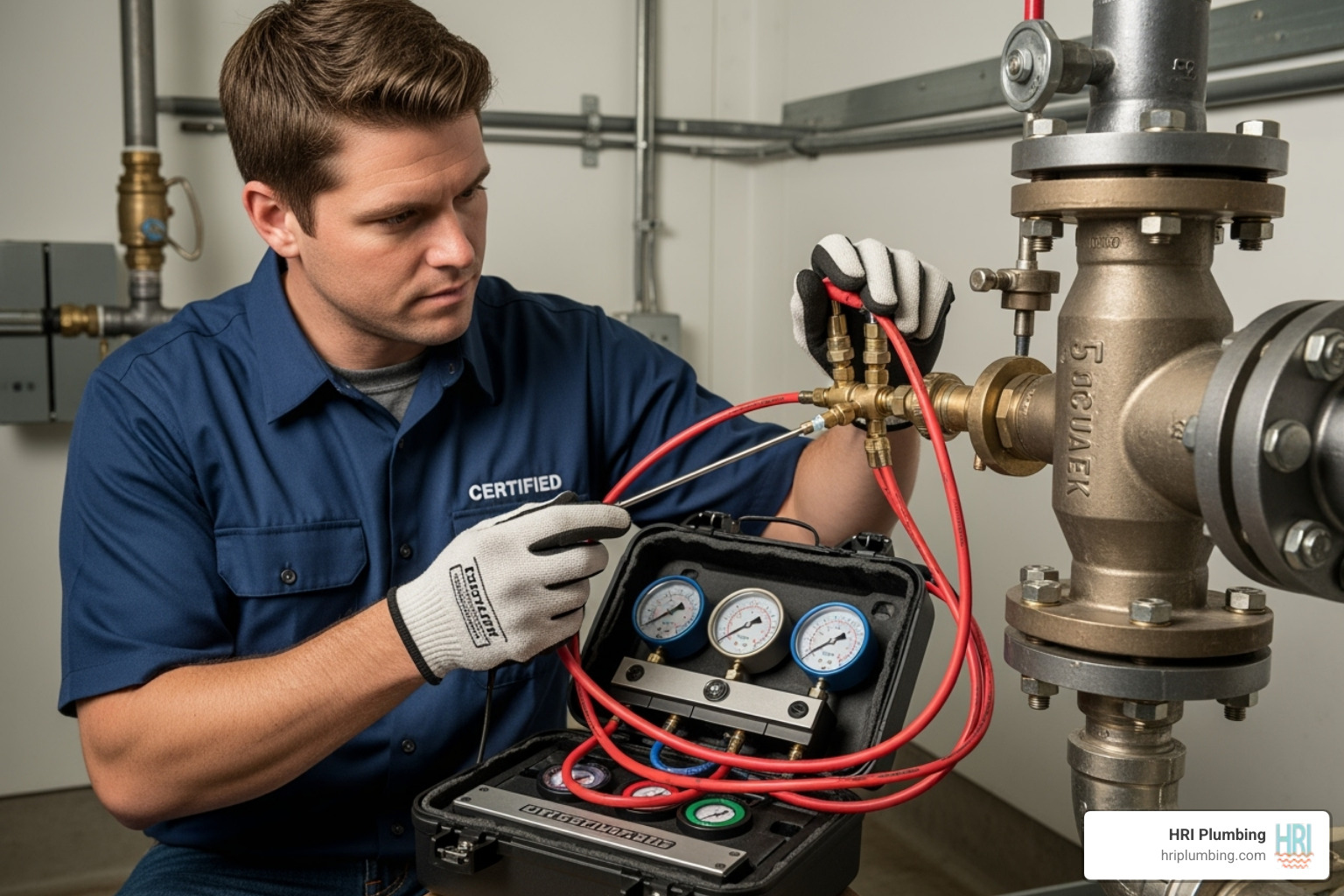
Installation is the first step in your water safety journey. Like any important equipment, backflow preventers require regular maintenance to ensure they continue to protect your drinking water. Our backflow prevention installation service extends to long-term support, keeping your system effective for years.
Why Hire a Pro for Your Backflow Prevention Installation Service?
While DIY is tempting, backflow prevention is a job for professionals. The health and safety of your family and community depend on it.
- Code Compliance: Our licensed plumbers are experts in local and state regulations, ensuring your installation passes inspection the first time.
- Correct Device Selection: We conduct a hazard assessment to match your property with the precise device it needs, preventing unnecessary costs or inadequate protection.
- Proper Installation: Certified technicians understand the critical details of placement, clearance, and orientation. Errors can compromise the system, but our team gets it right from the start.
- Community Safety: Professional installation protects not just your home but the entire community's water supply. This peace of mind is invaluable.
For reliable plumbing services, including expert backflow prevention, learn more about our Residential Plumber Springfield services.
Post-Installation: Testing and Maintenance Requirements
Regular testing and maintenance are essential to keep your backflow preventer working and your water safe. Immediately after installation, the device requires an initial test by a certified technician to verify it functions correctly. We handle this as part of our service.
After that, annual certification is required by most municipalities. A certified tester will use specialized equipment to ensure each component is working as designed. If a device fails inspection, we provide prompt repairs to restore compliance.
Most backflow preventers last 5 to 10 years. Regular maintenance helps maximize this lifespan. Between professional tests, watch for warning signs like water discoloration, a sudden pressure drop, unusual odors, or visible leaks around the device. If you notice any of these issues, call for service immediately. For more on this topic, read our article on Backflow Testing Helps Protect Your Drinking Water.
Your Local Experts in Water Safety
At HRI Plumbing, we believe clean, safe water is a fundamental right. We are committed to providing expert backflow prevention installation service and maintenance to homes and businesses throughout Jacksonville, Springfield, Rushville, Sherman, Rochester, and Chatham, IL.
Our reputation is built on honesty and integrity. We provide transparent recommendations you can trust. Water emergencies don't wait, and our 24/7 support means we're always here when you need us. With affordable rates and comprehensive maintenance plans, we make protecting your water supply straightforward and stress-free.
When it comes to your family's drinking water, you deserve local experts who are invested in the community's well-being. For comprehensive plumbing solutions, explore our roto-rooter services in Springfield, IL.


